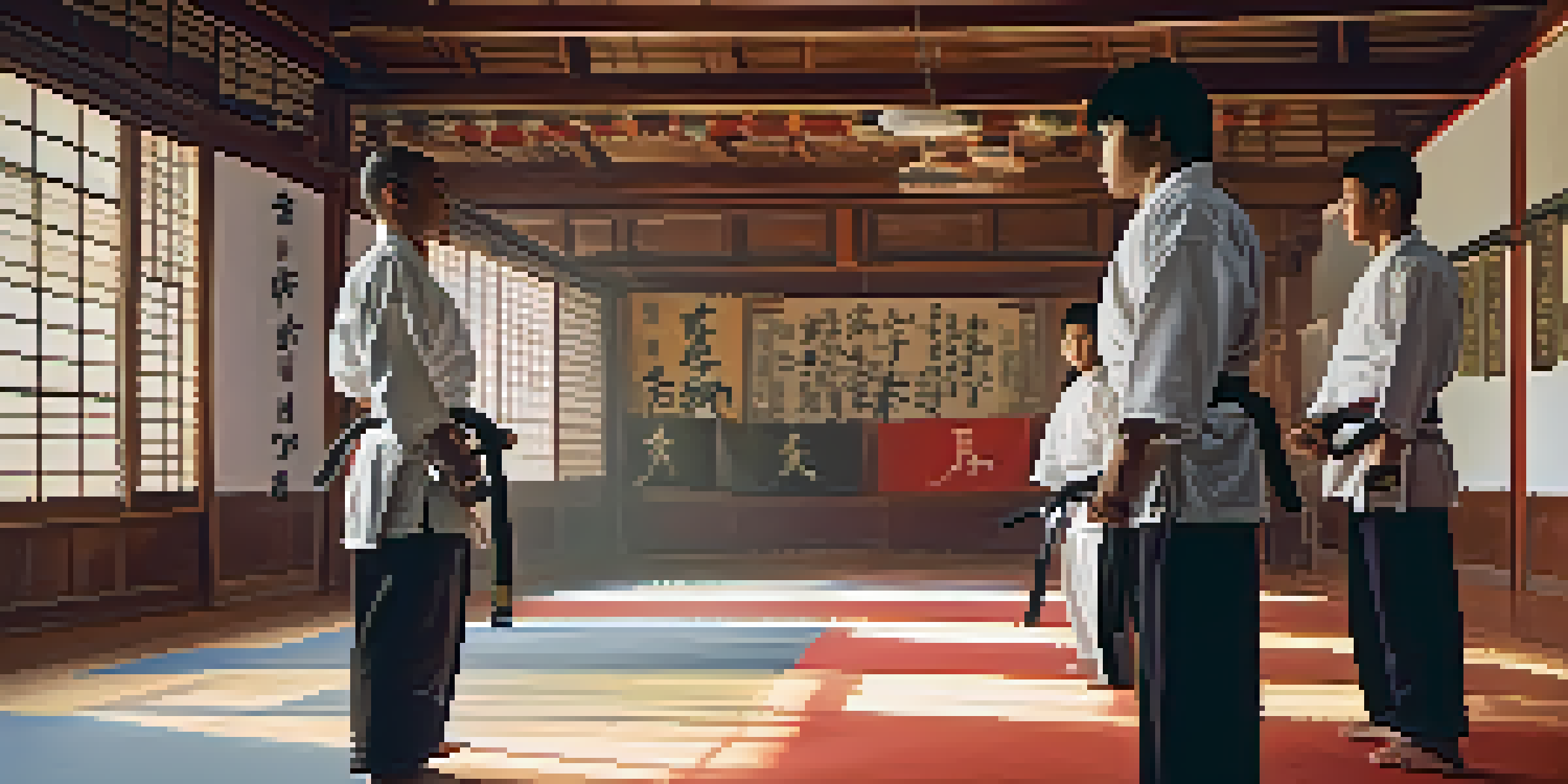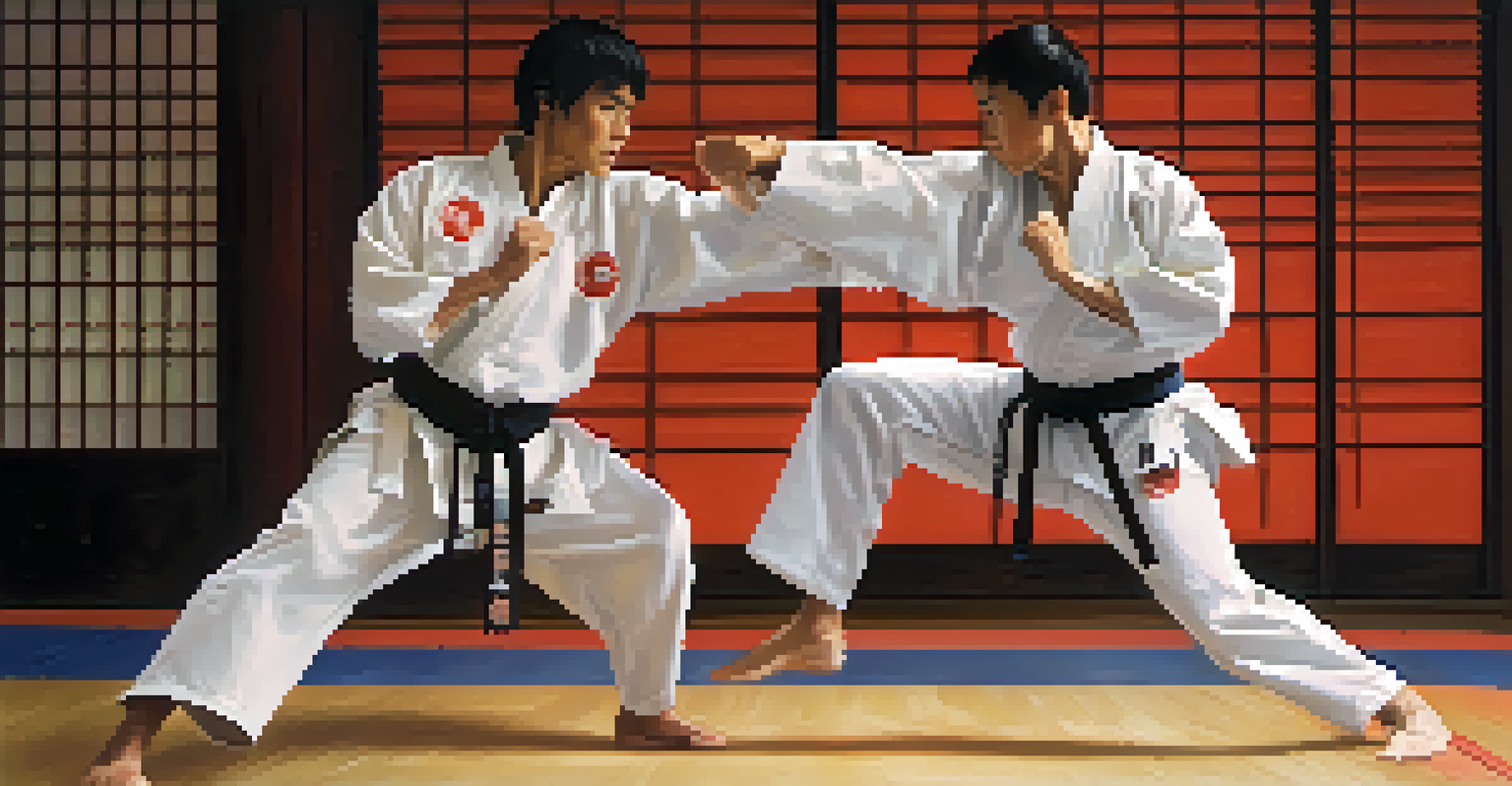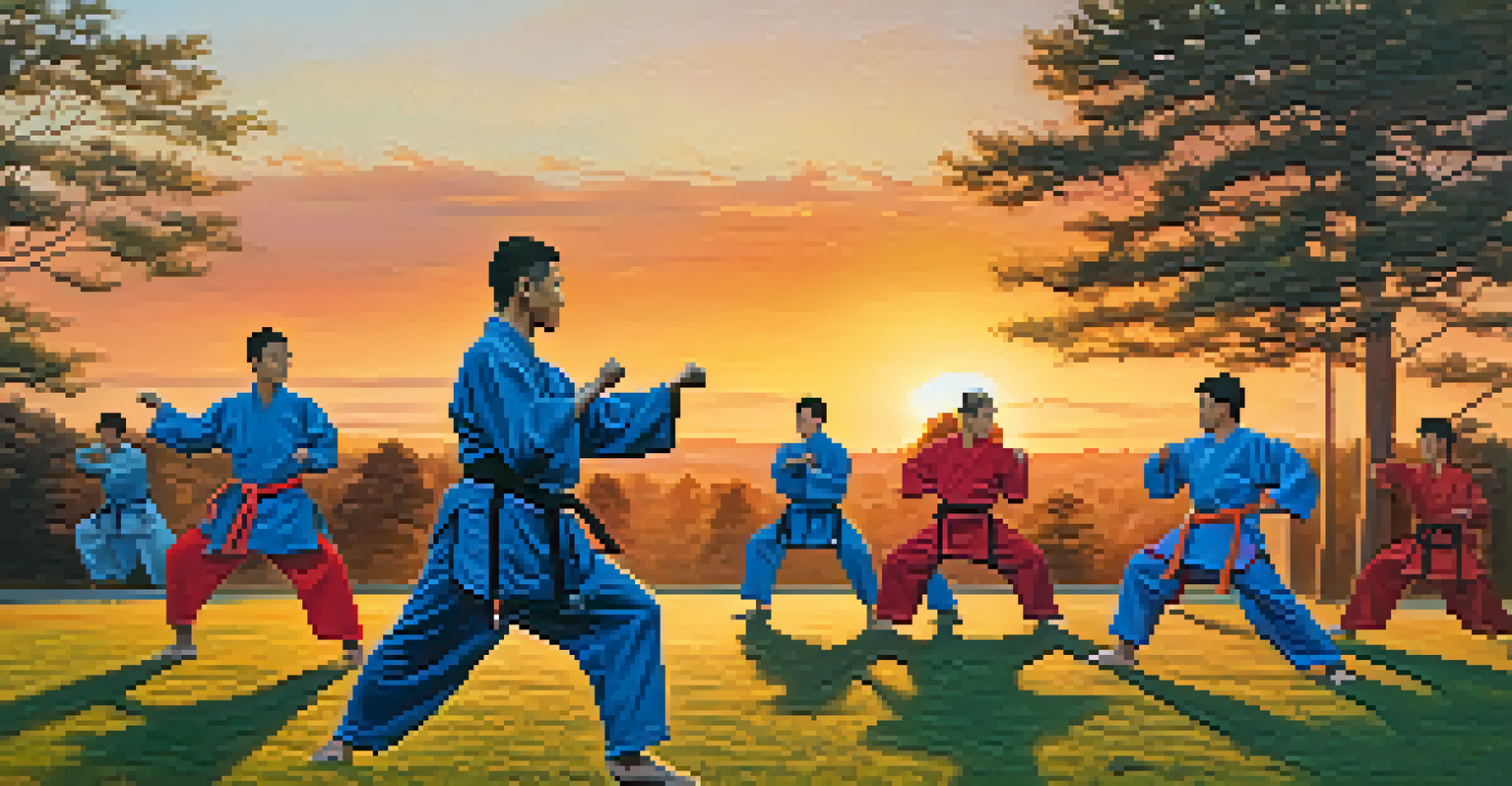How Martial Arts Training Enhances Conflict Resolution Skills

Understanding Martial Arts and Its Core Principles
Martial arts encompass a variety of fighting techniques and philosophies, focusing not just on physical prowess but also on mental discipline. At its core, martial arts teaches respect, self-control, and perseverance, all of which are essential when navigating conflicts. These foundational principles lay the groundwork for effective communication and understanding in high-stress situations.
The ultimate aim of martial arts is not having to use them.
For instance, practitioners learn to stay calm during intense moments, which can be particularly useful when facing disagreements. By approaching challenges with a clear mind, individuals are better equipped to resolve conflicts amicably rather than resorting to aggression. This mental clarity is a significant advantage in both personal and professional interactions.
Moreover, martial arts training often involves sparring and partner drills, which simulate real-life confrontations. Engaging in these scenarios encourages participants to think critically about their responses, further enhancing their ability to manage conflicts constructively.
Building Empathy Through Partner Training
One of the key aspects of martial arts is partner training, where students must learn to read their partner's movements and intentions. This practice fosters a sense of empathy, as individuals must put themselves in their partner's shoes to anticipate reactions. By developing this skill, martial artists become more attuned to the emotions and needs of others, which is crucial in resolving disputes.

For example, during a sparring session, if one partner shows signs of discomfort or hesitation, the other learns to adjust their approach accordingly. This responsiveness translates to everyday conflicts, where recognizing and validating someone else's feelings can defuse tension. Empathy allows for more productive conversations, helping parties find common ground.
Empathy Enhances Conflict Resolution
Through partner training in martial arts, practitioners develop empathy, which is crucial for understanding and resolving disputes.
Additionally, understanding physical cues and body language enhances overall communication skills. When individuals can interpret non-verbal signals effectively, they are less likely to misinterpret intentions, leading to clearer dialogue and improved conflict resolution outcomes.
Learning to Control Emotions in High-Pressure Situations
Martial arts training often involves scenarios that require quick decision-making and emotional regulation. Practitioners learn to manage their adrenaline and anxiety, which are common reactions during conflicts. This emotional control is invaluable, as it allows individuals to respond rather than react impulsively when faced with challenging situations.
It's not about being better than someone else. It's about being better than you used to be.
An example can be found in competitive martial arts, where maintaining composure is crucial for success. Athletes must focus on their strategy while managing the stress of competition. This experience directly translates to conflict resolution, where staying calm under pressure is key to finding viable solutions.
As martial artists practice these skills repeatedly, they become more adept at handling not only physical confrontations but also emotional ones. This mastery of emotional regulation makes it easier to approach conflicts with a level-headed perspective, fostering healthier interactions.
The Role of Discipline in Conflict Management
Discipline is a cornerstone of martial arts training, instilling a strong sense of responsibility and accountability in practitioners. This discipline translates well to conflict resolution, as individuals learn to take ownership of their actions and the consequences that follow. A disciplined mindset encourages thoughtful responses rather than knee-jerk reactions.
For instance, martial artists often adhere to a code of conduct that emphasizes respect for others. This principle encourages individuals to approach conflicts with a mindset of resolution rather than aggression. By prioritizing respect, they can navigate disagreements more effectively and maintain constructive relationships.
Emotional Control Under Pressure
Martial arts training teaches practitioners to manage their emotions, allowing them to respond thoughtfully in high-pressure situations.
Additionally, the focus on discipline cultivates patience, allowing individuals to take the time needed to understand various perspectives during a conflict. This patience can lead to more thorough discussions, helping all parties involved to feel heard and valued.
Effective Communication Skills Developed in Training
Communication is a vital component of martial arts; whether discussing techniques with instructors or sparring partners, clear dialogue is essential. This emphasis on communication helps practitioners articulate their thoughts and feelings more effectively, a skill that is directly applicable in conflict resolution. Understanding how to express oneself clearly can prevent misunderstandings and promote collaboration.
For example, during practice, martial artists often provide feedback to one another, learning how to give and receive constructive criticism. This exchange fosters a culture of openness, making it easier to tackle contentious issues without escalating tensions. When individuals feel comfortable expressing their viewpoints, conflicts can be addressed sooner and more effectively.
Moreover, martial arts training encourages active listening, where practitioners must pay close attention to their partners. This skill is crucial in resolving conflicts, as it allows individuals to fully grasp the concerns of others and respond thoughtfully, paving the way for mutual understanding.
Conflict Resolution through Strategy and Adaptability
Martial arts is not only about physical techniques; it also involves strategic thinking and adaptability. Practitioners learn to analyze situations and develop plans of action, skills that are invaluable when resolving conflicts. The ability to strategize ensures that individuals can approach disagreements with a clear plan, reducing the likelihood of escalation.
For instance, in martial arts, one must adapt to an opponent's movements and strategies in real-time. This adaptability can be mirrored in conflict resolution, where flexibility in approach can lead to more effective solutions. By being open to different perspectives, individuals can explore alternative paths to resolution.
Community Supports Conflict Management
The supportive environment of martial arts fosters collaboration and understanding, making it easier to navigate conflicts confidently.
This strategic mindset encourages a problem-solving attitude, as martial artists are trained to view challenges as opportunities for growth. By embracing this perspective, they can tackle conflicts with a constructive mindset, focusing on finding solutions rather than dwelling on problems.
Fostering a Community of Support and Understanding
Martial arts training often occurs in a community setting, where individuals support one another in their growth. This sense of camaraderie fosters an environment of understanding, where practitioners learn the value of collaboration and teamwork. Such a supportive community can significantly enhance conflict resolution skills, as individuals feel more comfortable navigating disagreements within a safe space.
For example, the shared experiences of training together create bonds that transcend individual differences. These connections promote a culture of open dialogue and mutual respect, making it easier to address conflicts as they arise. When individuals know they have the backing of their community, they are more likely to approach conflicts with confidence.

Additionally, the lessons learned in a supportive environment can extend beyond martial arts practice. Individuals can carry these values into their personal and professional lives, creating a ripple effect of improved conflict resolution skills within their broader communities.
Conclusion: The Lasting Impact of Martial Arts on Life Skills
In conclusion, martial arts training offers a wealth of benefits that extend far beyond physical fitness. The skills developed through this practice, such as empathy, emotional regulation, and effective communication, play a crucial role in enhancing conflict resolution abilities. By cultivating a disciplined mindset and strategic thinking, practitioners are better equipped to handle disputes in all areas of life.
Furthermore, the sense of community fostered within martial arts environments reinforces the importance of support and understanding when navigating conflicts. As individuals learn to approach disagreements with respect and openness, they can create more harmonious relationships both on and off the mat.
Ultimately, the lessons learned through martial arts training can have a profound and lasting impact, equipping individuals with the tools they need to engage in conflicts constructively and with confidence.